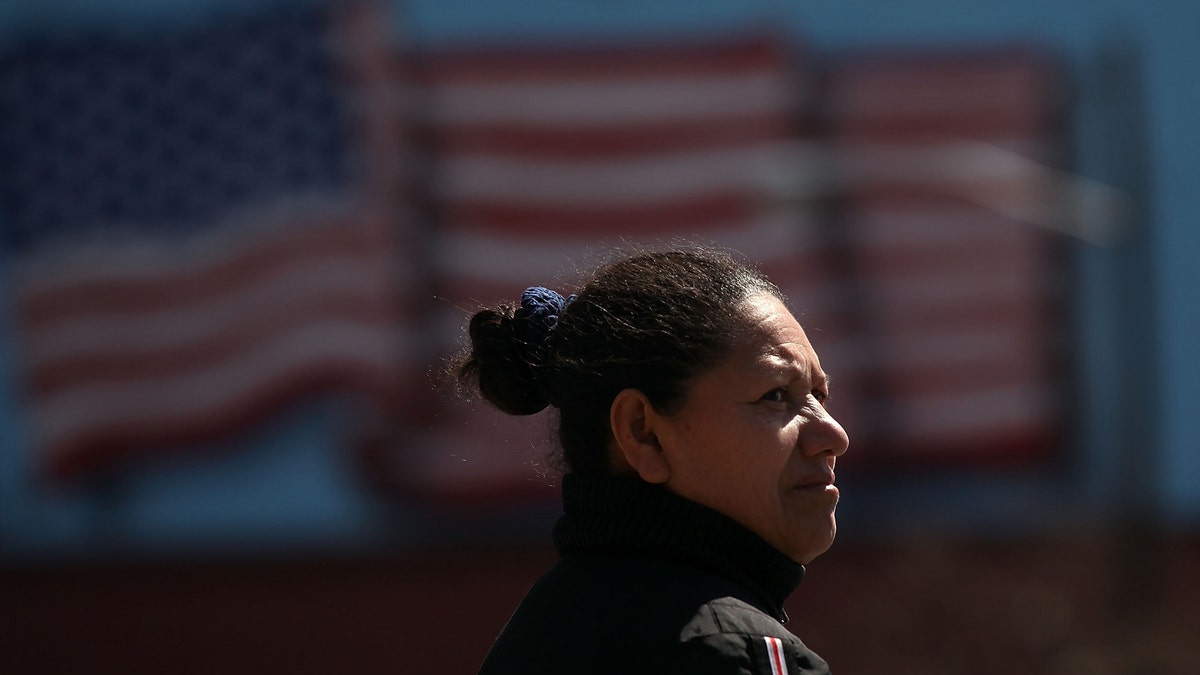
> on March 28, 2011 in Union City, New Jersey. (2011 Getty Images)
San Francisco, CA – In their second debate, the candidates for president talked —finally— about immigration, violence and women. What they did not talk about was violence against immigrant women and how our country's anti-immigrant laws make it worse for us and our children.
Too many immigrant women, forced into the shadows of society, have had to make the choice between protecting themselves or keeping their families together.
I have had to make that choice.
I endured abuse by my partner, while worrying constantly about my then three-year-old son. But, because of my immigration status, I feared what would happen if I contacted the authorities.
When I finally did make the decision to call, my fears turned out to be all too real.
Instead of helping us get away from my abusive partner, police arrested me. I spent five days in jail, separated from my son, before authorities moved me to immigration custody and began deportation proceedings.
Thankfully, by connecting with the nonprofit Mujeres Unidas y Activas (MUA), I secured a U visa. Provided for under the Violence Against Women Act (VAWA), these visas encourage immigrant victims of violence to come forward by offering them temporary legal status.
I know other women like me have not been so lucky.
President Obama did offer hope to more than a million young immigrants with his new Deferred Action for Childhood Arrivals (DACA) policy. But DACA will not help the mothers who raised them. He has vowed to create a roadmap to citizenship, but has also deported a record number of immigrants –separating mothers from their children— for minor infractions such as not wearing a seatbelt.
In the October 16 debate, Governor Romney again defended the heartless concept of “self-deportation” and missed yet another chance to condemn SB 1070, Arizona’s inhumane anti-immigrant law.
(He also came shockingly close to blaming single mothers, rather than assault weapons and criminals, for violence.)
And on the topics of immigration and violence, neither candidate mentioned the fact that the Violence Against Women Act is now under attack, with some legislators working to push back the very protections for immigrant women that changed everything for me and my son.
Journalists — and, in the town hall debate, a young woman named Lorraine Osorio — have pushed both candidates for details on what they would change about American immigration policy. But the voices and experiences of immigrants like me, the women whose families and daily lives are most deeply affected, are often left out.
That’s why today I am an activist with MUA, working to change U.S. immigration policy so that other women in my situation receive protection, not jail time. Protection from violent abusers — and from the scariest threat of all: being deported, and separated from our children, possibly forever.
There is cause for hope. We saw it after the second debate on social media and in the news, and we’ve seen it growing throughout the presidential campaign: we are in the midst of a groundswell of support for immigrant women.
Millions have seen and signed on to global human rights group Breakthrough’s #ImHere campaign to elevate respect for the real lives and rights of immigrant women. MUA has partnered with Breakthrough to help show just how many Americans of all stripes support commonsense immigration policy that recognizes the human rights of all.
I’m a happy ending. My son and I are safe. I have work as a janitor. But too many other women, women who work hard and deserve to be safe, still live in fear. Harsh anti-immigrant policies, such as the Secure Communities Act under which I was nearly deported, and state laws like Arizona’s SB 1070 and Georgia’s HB 87, continue to legitimize racism and racial profiling, scapegoat immigrants, and imprison women and families in their own homes.
We need to let our leaders and lawmakers know that we are here, we have human rights, and we have supporters and allies everywhere. No woman who fears being abused — or who is trying to protect a loved one — should be even more afraid to call for help.








































